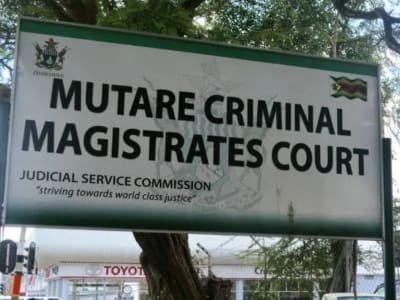Billions of dollars are being lost annually through the smuggling of goods across Zimbabwe's porous border posts - particularly Beitbridge - amid growing fears that corruption, weak security, and lack of political will are driving the surge in illicit trade and cross-border criminal activity.
The porous borders have also become escape routes for criminal syndicates and fugitives, who freely move between Zimbabwe and South Africa to commit high-level crimes, including armed robberies, drug trafficking, and human smuggling, according to experts.
South African anti-crime activist and Tax Justice South Africa (TJSA) founder, Yusuf Abramjee, told Business Times this week that cross-border criminal activities involving foreign nationals have become a serious concern.
"Foreign nationals in South Africa are involved in a range of offences, from petty theft and fraud to more serious crimes like drug trafficking, human trafficking, organised crime, and violent offences," Abramjee said.
"The issue of porous borders, and the Beitbridge border post in particular, exacerbates these challenges. The lack of adequate security, insufficient staffing, outdated technology, and corruption have created opportunities for criminal elements to operate with impunity."
He warned that the Beitbridge border, one of the busiest and most strategic ports of entry in southern Africa, is being exploited by organised crime networks for smuggling and illegal crossings.
"This allows for the easy entry and exit of individuals, the smuggling of illicit goods, and the transportation of stolen property," Abramjee said.
Abramjee accused authorities on both sides of the border of failing to act decisively, saying the problem persists due to political inertia and corruption within enforcement agencies.
"The lack of political will and commitment to prioritising border security contributes to the problem. This manifests in failure to implement reforms, address corruption, or allocate sufficient resources," he said.
"The consequences are far-reaching - including an increase in major crimes, the facilitation of transnational criminal networks, and a negative impact on South Africa's economy and social stability."
He said addressing the problem requires increased investment in border security, enhanced intelligence-sharing, international cooperation, and strong anti-corruption mechanisms.
Abramjee singled out the smuggling of tobacco products from Zimbabwe into South Africa as one of the biggest illicit trades costing both countries billions.
"Justice SA has repeatedly highlighted the smuggling of tobacco products from Zimbabwe into South Africa. While some arrests have been made, the kingpins are still not arrested," he said.
"This is organised crime. It's of major concern. The RG brand is being smuggled into South Africa on a large scale."
He added that tobacco smuggling alone costs South Africa billions of rand annually, though exact figures remain unclear due to underreporting and weak enforcement.
Abramjee said investigations involving foreign nationals are often complex and slow, hampered by jurisdictional issues, language barriers, and limited cooperation between countries.
"Investigating crimes involving foreign nationals requires international cooperation, which can be time-consuming due to differing legal systems and extradition processes," he noted.
"South Africa's law enforcement agencies also face capacity constraints - limited personnel, resources, and specialised training - to effectively address transnational crime."
Corruption within law enforcement and border control agencies, he said, further undermines efforts to combat the problem.
"Collusion between corrupt officials and criminal elements allows the smuggling of goods and people to continue unchecked."
Abramjee cautioned that the perception of rising crime linked to foreign nationals - whether or not supported by statistics - risks fuelling xenophobic tensions in South Africa.
"The perception of increased crime, regardless of actual data, can erode public trust in law enforcement and potentially fuel xenophobic sentiments," he warned.
He urged governments on both sides to act urgently to secure borders, root out corruption, and build trust between communities and law enforcement.
"The porous borders are a serious problem. There needs to be urgent interventions to stop the smuggling and the criminality that comes with it."
- Business Times
 Signed, sealed, and delivered US$1 billion
Signed, sealed, and delivered US$1 billion  SA media reporting on Eskom is racist
SA media reporting on Eskom is racist  Millions celebrate Diwali festival in India
Millions celebrate Diwali festival in India  SA bitcoin firm mulls Zimbabwe listing
SA bitcoin firm mulls Zimbabwe listing  Gold edges up as traders await guidance
Gold edges up as traders await guidance  Airlink applies for Lanseria to Harare, Bulawayo route
Airlink applies for Lanseria to Harare, Bulawayo route  Young Investment Professional (YIP) Graduate Programme 2019
Young Investment Professional (YIP) Graduate Programme 2019 










 Young Investment Professional (YIP) Graduate Programme 2019
Young Investment Professional (YIP) Graduate Programme 2019
Editor's Pick